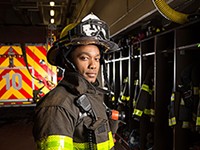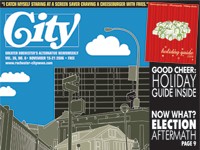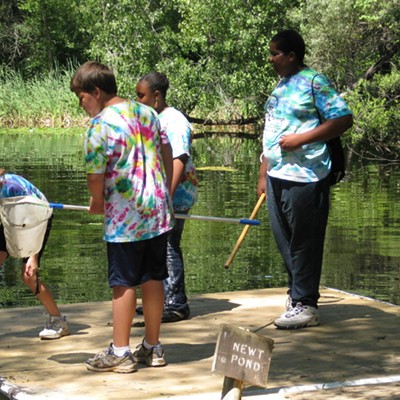[
{
"name": "500x250 Ad",
"insertPoint": "5",
"component": "15667920",
"parentWrapperClass": "",
"requiredCountToDisplay": "1"
}
]
There are 515 firefighters in Rochester. Thirty are black, 31 are Latino, and 7 are women. That means 447 of Rochester's firefighters--- about 90 percent --- are white men.
And that, says Ernest Flagler, needs to change. "Most of the time when we come off that truck, we see people that look like us," says Flagler, president of the Genesis chapter of the International Association of Black Professional Firefighters. People, he says, tend to trust those who resemble them.
If diversity in the city's fire department won't occur naturally, says Flagler, maybe it's time to force a change. United under the slogan "Keep the fire burning for justice," Genesis members are calling for an overhaul of the fire department's employment policies. Their demands include introducing a quota system into hiring and promotional exams, increasing recruitment to attract more Rochester residents, and maintaining residency requirements.
Standing in the way, however, is the civil service exam. All firefighters must pass this test to become eligible for the fire service. Applicants are then considered according to their exam score.
Because the exam process is state controlled, only municipalities that have received a variance can bypass the exam requirement. For example, Rochester's fire department runs a Firefighter Trainee Program at East High School. Students who complete that program don't have to take the civil service exam but can move into the second stage of the hiring process, which includes a physical agility test, a psychological test, and a background check.
But Flagler and his colleagues want more: They want a quota system requiring the city to hire a certain percentage of minority applicants. That, however, would violate the law.
So Genesis wants the city to pursue a system similar to the Rochester Police Department's. For more than 30 years, the RPD has operated under a federal consent decree establishing the ratio of minority new hires to non-minority.
Fire Chief Floyd Madison agrees that a consent decree would be the best way to guarantee diversity in the fire department. About a quarter of the workforce in both the RPD and the Buffalo fire department, which has also operated under a consent decree since the 1970's, are minorities, he says. New York City's fire department, which has minority rates as low as Rochester's, is pursuing a decree of its own. "The consent decree would be the way to go because simply it's legal," Madison says.
In essence, the consent decree would enable a minority applicant who scored in the 75th percentile on the civil service exam to be hired before a white applicant who scored much higher. There are those, acknowledges Madison, who believe such a system would lower standards. But he bristles at the suggestion: "Because you wrote a 100 or 90 does not make you any better than kids who wrote 80." A written test, he adds, can't measure one's ability to handle life-or-death situations.
A consent decree comes with its own challenges, however. In fact, the police department has had to seek a variance from its consent decree when it failed to recruit enough minority applicants to fill its quota. And a costly legal battle might take money away from other diversity initiatives, such as recruitment efforts.
It is possible, says Madison, that the RPD's decree could be amended to include the fire department. Deputy Mayor Patty Malgieri says the city is researching that option.
A possible alternative, says Madison, is eliminating the state exam. The city does not have to use the state exam, he says, as long as the exam it uses adheres to civil-service guidelines. Madison wants the city to hire a consultant who has created exams for other municipalities.
The issue, says Madison, is not that most minorities fail the civil service exam. Rather, he says, it's that minorities' scores tend to fall in the 80 range, well below the score needed to get into the competitive firefighting field. In Rochester, when the exam was last offered in 2003, more than 550 applicants passed. The fire department, however, hires only around 15 to 20 firefighters every year, Madison says. Under civil service guidelines, the new hires are all drawn from the top of the list.
A new exam, says Madison, would do more than test an applicant's ability to fill in the dots. Consultants, he says, typically use both a written and oral exam, which might help some minorities receive higher cumulative scores.
Madison also says the city is losing minority applicants during the four months it takes for the state to score the civil service exam. Using a consultant could shorten that time, he says, because exams wouldn't have to be shipped and processed elsewhere. Madison would also like to offer the exam more often.
But minorities cannot be treated as a single entity, Madison says. For example, during Madison's seven-year tenure as Rochester's fire chief, the number of women and blacks in the force has been static, while the number of Latinos has doubled. That means that any change to the system requires evaluating each minority group differently, Madison says. This gets complicated, he says, when different recruitment practices contradict each other.
A case in point: When the civil-service exam was last offered three years ago, city officials made it harder for non-city residents to become firefighters. Previously, applicants were given a grace period to move into Rochester. After 2003 only those already living in the city were contacted for the next stage of the hiring process.
The good news, says Madison, is that in the past three years, the city has made it much farther down the applicant list than in previous years. Applicants are numbered in the order in which they score on the civil-service exam. The city has now managed to reach applicant number 420, who is more likely to be a racial minority than those with, say, applicant number 113.
The bad news, though, is this: "We still have not been able to attract the female candidates in the numbers that we would like," Madison says. That's because most female applicants typically live outside the city.
So now Madison is considering eliminating the residency requirement and recruiting nationwide. That way, he says, he could recruit at minority job fairs and colleges.
But Genesis members say that will take jobs away from city residents. The issue isn't that Rochester women aren't interested in becoming firefighters, says Flagler; it's that the city isn't putting enough money into local recruitment efforts. So one of Genesis's more immediate demands is that the mayor amend the proposed 2006-07 budget to include money for recruiters. The police department receives funding for recruiters, Flagler says. So should the fire department.
In the long run, says Flagler, Genesis would also like every city resident to receive an extra 3 to 5 points on the civil service exam --- a move that would require state approval. "New York City has that law," he says. "They grant city residents five points. They're the only city in New York State that does that."
Genesis members also say that minorities deserve bothequal hiring opportunities and equal promotional ones. The fire department offers a lieutenant's exam every two years. And as with the civil service exam, most of the people scoring highest on the test are white.
Overhauling the entire system, say Genesis members, will take time, and a great deal of cooperation. Not to mention money. But the goal, says Flagler, is simple: "We need to get more minorities on the job."
Speaking of Rochester Fire Department, firefighter Diversity
-

Warren outlines lean budget that ‘reflects our new reality’
May 15, 2020 -

City budget cuts Mounted Patrol, 311 hours
May 17, 2013 -

Second chance for controversial fire program
Jan 30, 2013 - More »
Latest in News
More by Sujata Gupta
-

Bridging the racial divide
Nov 15, 2006 -

Home grown
Sep 27, 2006 -

Hiking: Happy trails
Sep 20, 2006 - More »






